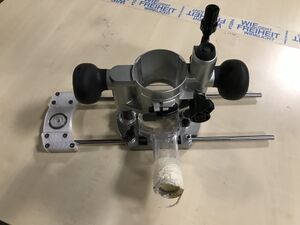Handheld Routers
| MachineInfoBox Routers | |
|---|---|

| |
| Synonyms: | plunge routers, handheld routers, electric trimmers, trimmer machines; DE: Oberfräsen, Handoberfräsmaschinen |
| Material: | wood |
| Used with: | router bits; router jigs |
| Access Requirements: | Handheld Router Introduction |
| Tutors: | Lukas NitramLegov Pakue Johannes Luzian Keno Utis Björn Jaggi2 Mobell |
| Similar (More or Less): | CNC router, router plane; milling table, CNC mill |
A router is basically a powerful motor spinning a sharp metal bit at high speeds. Read the manual before using and be aware of the difference between the regular "push" and the more dangerous "climb" cut!
Safety
Routers are very dangerous tools, make sure you have received the handheld router introduction in person and take time to think about what you are going to do!
Makita DRT50
| MachineInfoBox Makita DRT50 | |
|---|---|

| |
| Type: | Handheld Routers |
| Location: | Router Table |
| Access Requirements: | Handheld Router Introduction |
| Status: | Working |
| Manual: | Makita |
| Tutors: | Lukas NitramLegov Pakue Johannes Luzian Keno Utis Björn Jaggi2 Mobell |
Caution: the 8 mm collet needs to be tightened pretty hard because it only has a single compression slot! Use both wrenches forming a "V" to deliver enough force (or switch to 6 mm router bits if you have them). Failure to tighten the collet can result in the bit slipping downward during your cut, ruining your workpiece (and more if you don't notice soon enough)!
The router has its own box (Makpack) with all its accessories (DRT50RTJX2). It is battery powered with 18V Makita lithium batteries that are shared with our other Makita tools like the cordless drill. The set consists of:
- edge attachments (w/o grips; Kantenfräsmodule)
- straight or adjustable angle
- plunge attachment (with grips; Taucheinheit)
- long grip (can replace one of the stud grips)
- 2x vacuum dust attachment
- edge roller attachment (Kantenfräsanschlag) for following edges using bits without a bearing
-
edge attachment without grips
-
edge attachment with roller added
-
edge attachment that can be angled -45º – 30º
-
plunge attachment
-
plunge attachment, one grip replaced with the long variant
Dust Extraction

There are two different dust collection pieces, depending on which attachment you're using. Either one will need the black flexible adapter seen in the photo to fit on our shop vacs.
Additional Upgrades/Accessories
Freehand Baseplate
Lukas donated a custom baseplate bought from a local blogger (holzundleim.de). It should allow for much easier freehand routing!
It is made from HPL ("Resopal") and can be screwed to the straight edge attachment in place of its small round baseplate. To dive into the workpiece, let the baseplate rest on its rear (straight) side and slowly allow it to tip forward after the router bit reaches full speed.

The grips were turned from scrap ash wood as the original 3D printed ones felt too small. As suggested by the maker, the bottom edges were broken with 120 grit sandpaper to improve its sliding ability.
Circle Cutting Jig
Patrick made a 3D printed circle cutting jig that is used in combination with the plunge attachment. Cutting range is ~200-720 mm ⌀ (depending on the router bit used).

Clear Baseplate
Installing this baseplate to the plunge attachment gives you stability over large holes without obstructing your view!

Ferm FBF-1050E
| MachineInfoBox Ferm FBF-1050E | |
|---|---|

| |
| Type: | Handheld Routers |
| Location: | Router Table |
| Access Requirements: | Handheld Router Introduction |
| Status: | Working |
| Manual: | |
| Tutors: | Lukas NitramLegov Pakue Johannes Luzian Keno Utis Björn Jaggi2 Mobell |
This router comes with 6 and 8 mm collets (Spannzangen). A few other accessories, including a parallel fence, can be found in its box.

Past repairs:
- broken locking collar removed; faces for 14 mm wrench filed into shaft
Router Bits
(main article: Router Bits)
Router bits can get quite expensive, but good quality ones can be sharpened when they become dull.
Typical collet (Spannzangen) sizes are 6 and 8 mm.
A simple shared set of 8 mm router bits is available under the router table. As always, report when broken and replace them accordingly!
Copying Rings
Copying rings can be used for template work and are more versatile (although a bit more complicated) than flush trim bits with a ball bearing that takes care of the copying. When working with a copying ring, the template has to be offset from the target shape by a few millimeters: offset = (outer coyping ring diameter - bit diameter)/2 [1]
Future Plans
- self-built router table
- 3D copying jig
- "Pantorouter" guidance jig
Interesting Links
- "Router 101" video by "BrainFizz" - 35 minutes packed with valuable information
- video tutorial on feed direction by "StumpyNubs"
- Popular Woodworking: "10 Router Tips for Furniture Makers"




